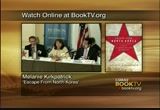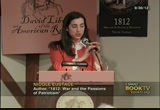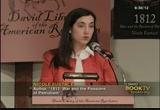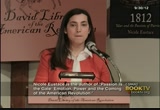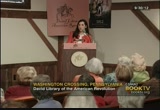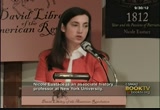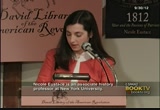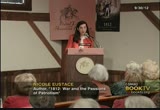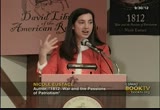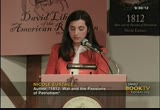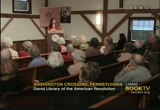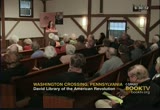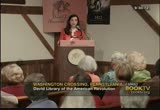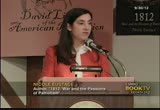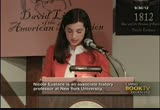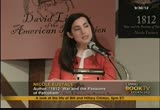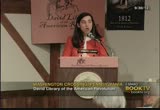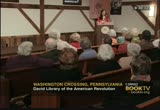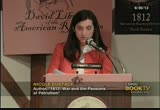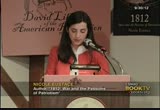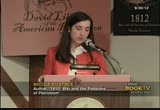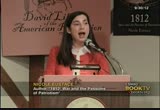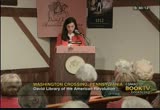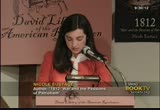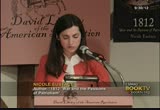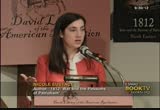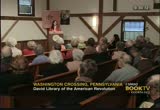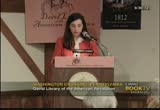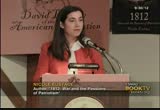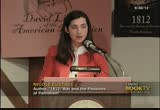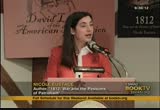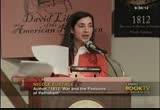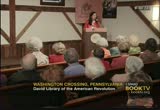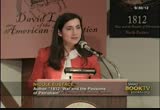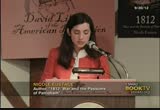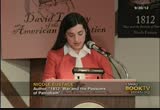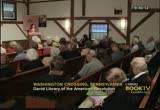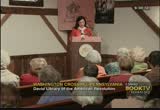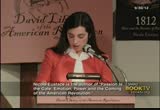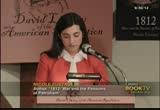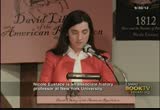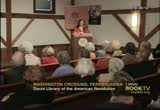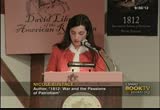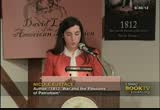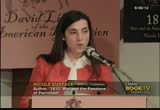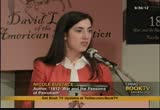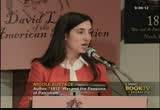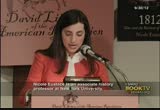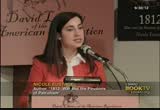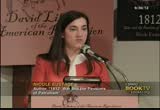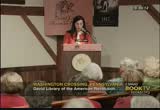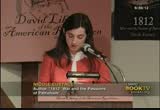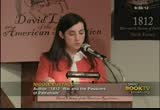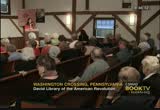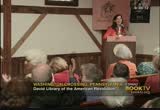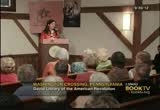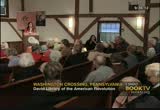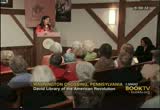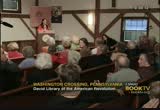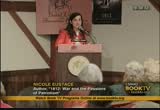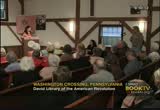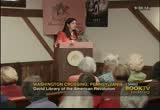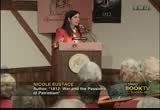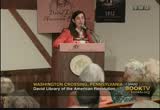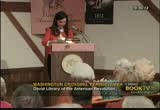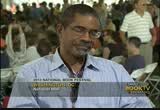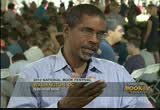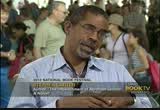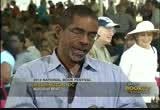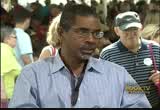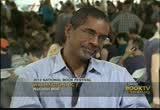tv Book TV CSPAN October 21, 2012 2:00pm-3:15pm EDT
2:00 pm
prosperous nation on earth and the north korean people are the world's happiest is being exposed for the lie that it is. examines the effect the war of 1812 had on american politics and patriotism. the author reports that the end of the three-year war resulted in the era of good feelings marked by the diffused partisanship and greater nationalism. it's a little over an hour. [applause] >> thank you very much for the introduction into the library for hosting me. exhibit real pleasure to be here and to see all of you this afternoon. thank you. the title of my talk this afternoon is love and honor in 1812.
2:01 pm
patriotism and popular culture in the new united states. on june 19th of 1812, james madison made public announcement of the first war ever to be declared in the history of the united states. he said, quote, i.e. exhort all the good people of the united states. as they love their country, as they feel wrong that they exert themselves. madison's call made clear that the expectation of showing love of country required giving support to the war. at a moment of national crisis, patriotism was needed. he sought to justify the conflict to the population at large and motivate the country to support the war. the stakes were high because although a majority in congress voted in favor of declaring the war not one single member of the
2:02 pm
federalist party voted in support of the war. the ticket very skeptical view of the war, far more so than did southern and western members of the democratic republican party that madison was leading. ostensibly a conflict with britain over the national sovereignty the american war of 1812 dirty quickly became a test or addition. a test of the strengths meaning of american patriotism. we have to forget about the war of 1812 losing track between the glory of the revolution of the independence movement and the transformative carnage of the civil war. that is that is the first war ever to be formally declared in the modern democracy income.
2:03 pm
public opinion matters. politicians gain and maintain power through the approval of the populace. by the war end in 1815 the british burned washington, d.c. to the ground, the national debt had nearly tripled for 45 million to 127 million all at the united states had accomplished was getting the british to agree to maintain the status quo and that is to keep all matters of diplomatic dispute exactly in the same status they had had before the war to read everything was going to stay exactly the same. regarding the war with favored. as a popular referendum in the
2:04 pm
popular election of 1812 and 1816. madison easily won the election in november of 1812 in the early months of the war and his hand-picked successor and a former secretary of war james monroe enjoyed landslide success four years later. hundreds of thousands of men cast votes for the democratic republic in those contests. the war in other words proved to be a rousing popular success. how did people come to form their opinions about the war? welcome usually not through direct observations. far many more people in the united states read and wrote about the war of 1812 and i will give you a member to give you a sense of this. they nation lost 2002 entered 60 men in the battle of 1812 and was less than one-half of 1% of
2:05 pm
all servicemen. many that served serve the local militia that for actual by contrast 617,000 combatants died in the civil war just to give you a sense of the difference in scale that we are talking about. statistics like these hint that the meaning of the war of 1812 can be found as much in popular print, and newspapers, books and about what telling about the war as it can be found in the battlefields themselves. contrast those numbers of service men with numbers on newspapers in. they produce approximately 250 different newspaper titles to
2:06 pm
the weekly messenger. that's about one newspaper franchise for every ten men who died in battle how many issues of each volume, how many actual newspaper franchisees there were if you want to assess the impact and the importance of the war of 1812. in 1812 americans took instructions about patriotism from a flood of popular print. a wash in discussions about national law of. from political speeches like madison to the tavern ballots and folk songs and the treatises and political economies to popular novels and sleeves to
2:07 pm
talk about love of country. a war that might easily if been dismissed as a trustee that could terrific waste of time and money if not this board as a disaster of hubris. instead, sparked what one newspaper famously described as an era of good feeling to the motions became central to the war's appraisal. everything was to be contemplated through the lens of patriotic love. throw the war of 18th of the popular conclusions about the meaning of events were liable to be based more on the emotional language used to describe them. while the europeans continue to declare their love of country to father kings and whereas american and french sons of
2:08 pm
liberty had fought a revolution against monarchs from what they call motives of brotherly love. americans in 1812 emphasized that their patriotism grew from yet another variety of familiar affection. the romantic love between courting couples. consider for example the songsters. it's called the love of country that appeared in the publication called the national songbook in 1813. the lyrics explained a soldier is a gentleman. his honor is his life and he that will stand to his post will never stand by his wife. since love and honor are the same or are so near that neither can exist alone but flourish side by side. then pretty girls of do and when we drove the british blogs we will to set out with you.
2:09 pm
so, there you have the title of my talk with the promise that love and honor are the same. they were told there was a fundamental connection between romantic attachments and national royalties. they made the best soldiers and vice versa soldiers made the best lovers. in the year of the war of 1812 the stories were seriously intertwined so much to us it seemed humorous. but the links between the war and romance more liberal as well as figurative. the patriotism that we might today jokingly somewhat as love, marriage and the baby carriage had a practical effect and that was to foster spectacular population expansion. high rates of marriage and reproduction resulted in the exponential growth of the american population. and this has significant
2:10 pm
implications for the nation's success in military contest not only with the british but also native americans in the age when starting a family usually meant clearing a farm enhancements in the size of the population and expansion of the territory nation went hand-in-hand. in fact although the united states won no changes in british policy as a result of the war the country did been the undisputed control of western land that had once been claimed by indians. they would soon be settled by white and cultivated in substantial part by enslaved men and women. now, what this means is that all members of the nation's populace no matter the suffix status and no matter whether they could vote for or against the president could assist in the process of selling and thereby securing the nation's land. with no casual choice of war when madison did not call on all
2:11 pm
of the nation's citizens to support their country. instead, she called far more broadly to all the good people of the united states. as they loved their country to exert themselves. those loving people including the nation's entire population male or female, sleeve or free excluding only the indian inhabitants of the continent who continued to struggle for their own sovereignty. now what i would like to do in the time that we have to get your is to try to bring to life the power of the rhetoric of romantic patriotism by presenting the two contrasting episodes from the war. one of a general who disdained the work of the rhetoric only to suffer military catastrophe and personal willing. the other who increased from the romantic patriotism in the process became the most celebrated military leader of
2:12 pm
the war of 1812, and the future american president. i am referring as you no doubt guest you know the history at all to the opening, of the conflict when general william holt failed utterly in an attempt to claim of the contest and to the war ethics conclusion when the general andrew jackson achieved a spectacular triumph at new orleans. as we will see the language of love proved pivotal to the public a variation of these events. when the americans found their imaginations captured whenever this dhaka was replayed as a love story. no matter how dire the event of the day, pro war commentators could be counted on to but a romantic gloss on public events. the war of 1812 provided an ideal moment for americans from anonymous unknown like the author of the soldiers ballett to the leading national
2:13 pm
statesman to mold the meaning of love of country is a romantic and venture they won the hearts of patriotic maidens and one in which the thrill of the romantic love contributed directly to the glow of victory. now, before i take you on this unconventional cultural chronology of the war, i do want to first pause to take a careful look at contemporary theory of political economy. we will go back to soldiers and love songs that we can appreciate the significance of this rhetoric of romantic patriotism unless we first get a good grasp of the serious scientific thinking that leaves behind it. informal pherae, freedom to love, marry and reproduce came essential elements of those american liberty and american
2:14 pm
power. in the year of 1912 were themselves actually very well versed in population. regular methodical government accounts of all of the country's inhabitants meant that even average people had assets access to the basic fact of the nation's population strength. from the time of the first national census in 1790 to the second which was in 1800, the nation's numbers expanded from approximately 3.9 million to about 5.3 million they continued rising sharply reaching 7.2 million by the third in 1810. so in total the nation's numbers increased nearly tenfold in just two decades. these official figures were reported widely in the regional and local newspapers as soon as the return to a man. a complete census reports or printed some time some kind of commemorative editions with county by county compilations and made available for public
2:15 pm
purchase. the numbers also featured in most standard almanacs the kind of basic information that even ordinary folks wanted to have at their fingertips. there is a lot of attention paid and a lot of national pride based on the growth of the nation's numbers in the robust population. they are vulnerable to a critique of morals. throughout the first quarter century of u.s. independence, britain and america chased each other about questions of population. it's optimization. even as white americans claim to need enslaved africans and african-americans to people of the labor force coveted to support ever-growing numbers of the nation's people.
2:16 pm
on the continent, the british continued to cultivate diplomatic and economic ties with native americans supporting the petition from whom the united states received the greatest threat to read on the ocean burton kunkel atlantic shipping forbidding the atlantic slave trade after 1807 and harassing u.s. merchants vessels. meanwhile burton's traditional goals population limitations because usually the british fought on their small islands of their main worry was too many people. but on the seas the navy needed every hand it could find on deck avoiding the american ships provoked enormous controversy. more so since the efforts could sweep americans into british mess. in the midst of such moral and political confusion both americans and the british made better efforts to maintain the better claim to virtue.
2:17 pm
in the early years of the 1800's compounded every element of the promise and the problems of population and the united states in the form of the british the arrest thomas. he was the author of a book you've probably heard of an essay on the principal of population. you may not know the subtitle. it was an inquiry into our prospect respecting the future removal or mitigation of the evil that is the locations. it was first published in england in 1798 and was reprinted in the united states in a local edition by 1803. he offered his model of population as mere scientific extraction but as a concrete analysis of the geopolitics.
2:18 pm
a feeling overpopulation as the main cause of famine and suffering, he was an anglican clergyman censured and restrained production as one of the main moral evils. he argued that the best way to restrict the runaway population growth was four young men and women to delay marriage and that way they could spend a few more years civil but in the single state before they started raising families. and that would reduce the final number of children born to any given married couple and would diminish the overall average size of the families in the country. the chief object of his analysis was the rapidly expanding united states. taking a hard look at u.s. ambitions to exert ever greater control over the continent of north america, he concluded, quote, if america continues increasing which she will
2:19 pm
certainly do will be driven further and further back into the country to the whole race is ultimately exterminated. how could the united states claim to be the strongest defenders of freedom when it denied the basic rights of survival to the native americans. he declared even the inhabitants of people's regions of the questions of a moral view. he had good reason to be on the u.s. population strength since the nation's numbers had been increasing at such a remarkable pace. with no european rivals to contend with and nothing stood in the way of a doubling of u.s. land and a redoubling of u.s. populations except the thousands of indians who continued to live on their native ground. the united states best provide a perfect object lessons that excess populations fuel the
2:20 pm
territorial aggressions in what many americans saw as a virtuous cycle that many native americans and british allies saw as more of a vicious circle. the continent's wide open ground support of the demographic expansion even as the increasing u.s. populations enable the seizure and the settlement of new land. the resulting divergence in british versus attitudes towards the merits of population between the two nations on the eve of the war. and in fact president thomas jefferson was the architect of the doubling of the nation's land at the louisiana purchase objections directly in mind at the moment that he engineered the purchase. the u.s. formal possession of the region on december 30th of 1803 exactly one month later on
2:21 pm
february 1st, 1804 jefferson wrote a letter in which he confessed to, quote, giving the leisure moments to the perusal of his work on population. though careful to the acknowledged that his work was indeed one of, quote, sound logic, jefferson insisted that the english and's theories could not be applied to the united states. jefferson concluded to the contrary that in america, "of cnn's extent of on cultivated and fertile land enables everyone who will labor to very young so you don't have to delay marriage and jefferson's america you can marry young and raise a family of any size. if he claims that america's burgeoning population forced territorial expansion, jefferson inverted the logic. he asserted the virtually limitless ability of american land assured that the practical purposes there could be no such thing as excess population.
2:22 pm
jefferson reassured, quote, however multiplied it becomes effective. the right to love and marriage and reproduce for fundamental liberties enjoyed in america and in his survey of the situation indians were just completely overlooked altogether. like his predecessor in office, president james madison preferred to celebrate american population strength. the presidents shared the perspective of the mutual more time correspondent. this just freedom of circulation trade and also unrestraint production. as jefferson wrote at the war and in 1815 his hope for his country was that with the british a vanquished americans would last be permitted to proceed peaceably in making
2:23 pm
children and measuring and molding the strengths and resources. making children could be a wholly peaceable process. the official republican view that population was essential to american national strength became one of the most enduring legacies of the war to read by the time that u.s. british tensions reached the breaking point in 1812, americans reveled in the connections between population strength and territorial spread that nellis is regarded to the country as a source of evil. furthermore, americans argued that romantic love has exactly the opposite of the tyranny and oppression predicted by malfis ne u.n. freedom and the most exalted a motion was romantic love. as the virginia plantation owner
2:24 pm
and american political theorist john taylor explained at, malthis was in favor of resorting to the lock law. he said it teaches us in the english system one must devote one party to death by famine or the necessity of living above have the lives without affection. according to taylor england was offering deep a stark choice between starvation on one hand or marital delays, population limitations and the emotional precision on the other to retain their even went so far as to use opposition to malthus as a means of justifying slavery. he attacked malthus with imposing the kind of moral slavery on his father's doubles worse than any kind of legal slavery. if malthus, quote, proposes to introduce a system of celibacy, tayler asked, who could fail to
2:25 pm
notice the difference in point of benevolence between indirect slavery to an absolute master and direct slavery to an absolute master. in a tayler's america even though subjected to, quote connecticut slavery to its absolute master retains the right to reproduce. in his america than a matter of the other freedoms of were denied to enslaved people including the right to legal marriage and indeed to yonah their own children they didn't have the right to reproduce in danger of malthus's england. the slave holders that could boast that african-americans and of bondage had a greater basic civil liberties and privileges than freeborn englishmen in his bringing. meanwhile white americans enjoyed natural rights to love and marriage that were impossible to imagine in the cramped english island.
2:26 pm
print was the key arena where these ideas were spread where public and private intercepted and where personal behavior could be glossed with political meaning. malthus had wide exposure in american popular culture and there were local american reprints of his book and long excerpts of his work reprinted in newspapers oftentimes critical commentary debating against him and casual comments in books and broadsides. i don't have time to go into detail but there is one funny and memorable american maxxam that can stand in for the general popular reaction. and author by the name of nason you may remember him as the author of a popular biography of george washington. at that time he was equally well known for a book on marriage. he said, quote, i am very clear that the buckskin heroes of our nation the good stuff as the
2:27 pm
best of the beef eating gentry and the other side of the water but being good soldiers wasn't enough. nothing could save the united states while the british could outnumber them ten crusco one. no, my friend, his population, his population alone that can save our begin. if this wasn't explicit enough as a motto we then want the vehicle went on to lay it on thick telling bachelor's and maidens fair if you truly love your country deer, marry and raise of soldiers might. then last year made in england, france and spain. she made clear population expansion offered the united states assurance of success over all levels. by the time of his message than the people of the country had long been instructed that engaging in patriotic duty
2:28 pm
consisted first and foremost and indulging in romantic pleasures. the actual efficacy of those assumptions was about to be put to the test. let's turn now from free to practice and look at how the stories diverge actually got under way. throughout the spring and summer of the team 12, before the first action of the war began, newspapers across the nation really early reports of the emotional status of the army as if this were the best indicator of the war's prospects. various article stated, for example, quote, that the troops are in fine spirits anxious to be led across to the enemy or that they were all in high spirits and we feel confident of success or the men move on with great spirit and alacrity. the nation and its soldiers made
2:29 pm
emotional preparations only for victory. but the first confrontation with the british in the debacle in the event general william surrendered 5,000 u.s. troops at detroit without firing a single shot. the country was not only shocked by this defeat but they were certain that emotional shortcomings must have been to blame. the question was whose feelings had caused this? surely neither the romantic patriots reading the newspapers nor those fighters filling up the rank and file of the troops could be to blame. one man was held responsible for the disasters, general william hall. before the court martial he faced formal charges from, quote, treason against the united states to, quote, power it as an neighborhood to, quote.
2:30 pm
where it may really get interesting is when the accord specifies what they need on the officer's conduct. the formal charges included the claim that through his negligence, quote, the general arbor of the army in sensibly abated. according to the court, maintaining order in the fighting force is one of the general's most important duties. sending of the scene in detroit, the court held that, quote, the northwestern army of the united states being then and there in fine spirits and eager to meet the approaching army in battle had been thwarted by a general willing to enter into a shameful capitulation. ..
2:31 pm
in defending his decision to surrender, he laid out a clear account of the monumental organizational problem he faced. the nation had declared war with little to no prior preparation and faced severe shortages of men and material as a result. of course he also categorically denies he ever shown cowardice in taking what he viewed as a pragmatic action to save the lives of his otherwise doomed troops. he also emphatically disputed that emotional primate had any
2:32 pm
useful us back on military preparedness. whole argued that the men quote, though they were very ardent unpatriotic and their expression had had no service. neither men nor officers had ever been tried. he went on to say, it is not extraordinary initiative house on want of confidence in the straw truth. patriotic order was no substitute for armed effectiveness. no matter the emotional charges against him, he tried to steer the trial back to clear-sighted accounting of the true challenges facing the nation that had gone to worry with only the most limited military infrastructure. critics of the war, amongst the fatah list agree completely withholds decision, that men who claim to feel great order before they had experienced any military action are mistaking
2:33 pm
shadow. across new england from the first is that the work of the last, calvin and federalists were opponents railed against the role of ardent passion in creating public support for the war. according to federalist allies, members of the new england clergy, men who joined the site by the feelings of art or were acting a dilution, respond in like sheep. quote, i feel as an american love of the country of my nativity and pastor qaeda bailey of newcastle main that he preached on july 23rd, 1812. but he argued quote, war proceeds from the worst passions and tends greatly to inflame them he went on to quote the assembled parishioners quote, from worse infighting among you.
2:34 pm
had they not had stephen of your love, which were in your members. federalists did not dispute that there was a deep connection between the emotional and the marginal. but they insisted that were passions stemmed from sinful and as such, deserve pronunciation, not celebration. now i want to be clear here. winnowing glitters in this era fought about last, they had quote, carnal desire directly in mind, carnal desire. that is the definition for last those providing the first-ever american dictionary, noah webster's american dictionary, which was published in 1806. to be quote, lustful, according to webster was to have a regular desires for behaving lustfully was to do something in a quote lustful or lecture us manner.
2:35 pm
yet despite all of these imputations of deviancy, webster also noted that to do some being lustily was to do it stop me, boldly, with courage. so connections between passion and action come between arousal and courageous resolve for wolf and into the very vocabulary of american english in the area of 1812. ministers who were opposed to the passions found eager supporters amongst the parishioners. along with his formal sermons that have just been talking about, printers also circulated thoughts of writing by ordinary people that took similar points of view. when antiwar poem was published as a broadside poster, written by a man named william allen from newport, rhode island, ryan, war, carnage, devastation, many die in the sacred page, all these from our last.
2:36 pm
so from formal sermons, war opponents easily accepted the association between violent action and file passion. the biblical basis of claims that worse resulted from last was accepted as common knowledge across new england. but among war supporters come at the very same equation was made to field a very different solution. pro were consistently asserted the essential connection between love and patriotism. intended by their very nature to stir the blood meant to motivate action come also encourage people to pursue pleasure. a little ditty use the trope of the hobbyhorse teammate explicit the equation between sex and soldiery, love and liberty and intense they are worth quoting at length. somewhat like this. the the heartiest soldiers in
2:37 pm
time of great wars his breeches in battle with blood, wounds and scars. but mps coming to lips that's quite different they are treated. and peace, hobby of soldiers is the ladies at the ladysmith creaturescoming guest day now intend to their hobbies stress like a man, with smiles, they got a less at ease and weak outlook, trot and amble, even as we please. the american hobbies have long since been known. no tyrant or king shall for them have they thrown. their states are united and let it be said, their hobbies liberty, peace and free trade. as these verses help enunciate and one american the early republic cast together with the marshal, the peril of war could be entirely eclipsed by the ironic. such songs encouraged men and women alike to imagine national employments as personal
2:38 pm
enjoyments. the popularity of ardent patriotism had important and widespread implication. no broadly speaking, these kinds of frisky war songs help to undercut the tedious moral calculations of federal were opponents feared more specifically, the whole child's emphasis on emotion transformed a general failure into something that was almost but not a sin. on november 4 of 1812, reflecting on the impact and a short and at the height of his reelection effort, madison declared, quote, the nation spirit rises according to the pressure on it. the loss of an important post as the brave men surrendered to date inspired everywhere a new order and determination. days later of course he wasn't a bid for reelection. when even the president relied first and foremost on the rise of ardor for the preservation of
2:39 pm
the nations, hole stood little chance of winning his case on the basis of reason analysis alone. his sole responsibility for systemic unpreparedness that he was testing will candidly with overcoming. but his inability to understand the importance of making emotional appeals to the people in an age in print culture made public opinion matter as never before marked him as a man on the steps of the times. in the end, none of holes no matter how factual could overrides the courses in the nation's embrace of emotional. he was handed a capital sentence by a court. now, president madison and the old general, but only after the election faced someone. claims that emotion mattered as much as accomplishment come and do patriotic love actually made
2:40 pm
an important public contribution to open the way for inhabitants of the country to imagine that their own private would aid in public effort. and since so few people could claim any kind of immediate experience, the kind that is guided decisions of detroit, romantic stories about the war inspired could easily sway public opinion about the conflict. now, let's turn to the pose of the war and general andrew jackson. general andrew jackson proves to be general william hull antipathies in every way. if hull open the work by exposing the nation, jackson closed in a blaze of glory that earned him lasting renown. and if hull claimed that ardor without action counted for nothing, jackson understood clearly that emotion could actually be both a successful prod to exertion and in effect property for it.
2:41 pm
give me one second here. i knew there was a bottle of water. so let's talk a little bit about andrew jackson's triumph at new orleans and the nation's ultimate embrace of the rhetoric of patriotic romance. the most popular narrative portrayal of jackson's action came from the pen of the santa biographer, john eaton. john even set out deliberately to elevate jackson in ways that indicted direct comparison to william general hull. where has hull had given him more than two dozen prisoners, jackson inflicted over two dozen casualties, whereas hull, hero of the american revolution and prefer to be in command in a disciplined, professional army, jackson proved himself capable of winning with a ragtag militia. most of all, while hull c. for the way he had allowed the order
2:42 pm
of his men to become intensively abated, eaton stressed repeatedly that jackson had risen to the natural order of his temper. and that in every campaign, jackson was everywhere amongst his troops, quote, inspiring them with the order that animated his own bosom. when it came time to describe new orleans specifically, eaton provided an account of his speech that jackson made to this man that made absolutely clear the links between passionate arousal and patriotic action. eaton claims that jackson delivered his address with the definite goal of inspiring demand to preserve their order a devotion to country. even in jackson said look to your liberty, your property, the chastity of your wives and daughters. jackson went demand to be aware that at their worst, british
2:43 pm
soldiers could inflict race and american women. the practice is totally unauthorized and was not commonplace, but there was one isolated document to british atrocities in virginia. jackson threw one bad event in his speech. he urged quote, take a retrospect of the conduct of the british army at hampton and every but some come which closed patriotism and virtue will be inspired. by directly invoking race in the effort to produce into action, jackson advanced explicitly the idea that the war of 1812 was as much a fight against british sexual tyranny than any positive definition of liberty. in fact, jackson and eaton together helped spread around his story about english depravity at new orleans, and that leaves much to arouse avows
2:44 pm
americans to patriotism india are not of the war. let's talk a little bit about the spread of history. on february 16, 1815, when the united states house of representatives managed to devise an official congressional resolution of general jackson, jared ingersoll, a republican from philadelphia took to the floor and exclaimed, quote, for the first time during this long, arduous and trying session, we can all feel alike. we are all of one mind, all hearts leapt up to the embraces of the other. why was ingersoll's heart leaping? well, the fact success of new orleans had been known for a week or so, but ingersoll's related to a new and juicy gossip. he informed his colleagues that word had just arrived at on the occasion of the failed invasion of new orleans, british officers had offered, quote coming beauty
2:45 pm
and duty, in other words the reward of victory, end quote. ingersoll chortled, dost lead and that's invited to british army needed storm. they succumb to churn but just without example. never has there been such disparity of loss. the shocking story electrified the capital. the suppose the decision of the british to authorize extreme measures had only produced the most extraordinary duties. now, this story had no fact. this is a point i investigated at length in my book. i actually trace it to the source. it's quite an interesting story itself. but the massive beauty and moody sent exactly the message they had always wanted to give. from the beginning, the work 1812 had been fought as a contest of the meaning and validity of american claims to chant in liberty and an expansionist age, whereas
2:46 pm
british commentators were trying to seize the moral high ground by critiquing american slavery and western expansion. a story of beauty and beauty in the muck of their own hypocrisy. a jackson's biographer e. been explained in his account of the battle, which featured the story rather prominently, quote, the watchword of sara shourd pakistan's army. his criminality is increased from the act of the people who hold themselves up to surrounding nations as example of everything that is correct improper. by tarring the british with accusations of sexual depravity can americans promote themselves as the last guardian of an essential element of virtue. conversely, the british could no longer hold themselves up as a satellite standard to which americans should aspire.
2:47 pm
besides making great gossip, scandal polish the u.s. image as a uniquely virtuous nation. the most fundamental form of liberty, sexual consent from british abuse. each person who repeated the story of beauty and booty helped validate assertion that american men proper country because of the romantic love that they felt for sweethearts and because of their determination to offer their women affect his protection. in doing so, u.s. soldiers in asking the love of liberty was entirely different from british tyranny. throughout 1815, cities and towns across the nation through festive dinners and dances in honor of andrew jackson and he attended many of these unassertive victory to her. men and women alike gather to celebrate the coming of peace and to repeat the pitcher
2:48 pm
brickbats of how general jackson had saved the women of the country. in georgetown in december of 1815, for example, celebrants offered a toast, urging the feelings of peachtree to some and duty opposed to the watchword of beauty and booty. jackson raised his glass. the midst and became woven into the national fabric, a popular song called the hunters of kentucky rind, quote, you've heard i suppose how new orleans is famed for wealth and beauty. there's girls at every hue, it seems, from snowy white to snooty. so he made his brags if ian feith was lucky, he'd have their growth and cotton bags in spite of old kentucky. interestingly for song came in, they showed white men and black men fighting side-by-side to protect women of quote every hue by british forces.
2:49 pm
contemporary celebrated by contributions to jackson said he and make claims that the british had plans to target for assault. they closed by posting the british took to fight all the beauty. and england are safe for first kentucky boys and will protect the ladies. it is an broadside from all across the country. the real beauty of the story as it came to be elaborated was that it helps from leading politicians and family pitcher got argue it was the mark of true tierney. leading man could print out right to freedom and mothers both the first and the first of every other kind of liberty. with the circular logic as falling in love became patriotic duties, the right to procreate
2:50 pm
and turned to find the essence of freedom. in this context, it even knows that no formal voice in government could be asked to lend their way to the national effort. maximizing the number of people who could be mustered for the country and relaxing barriers to public participation, finding new ways to inspire loyalty to the land, encouraging reproduction. but the stress of war making every person's contribution count, personal feelings and patriotic became connected anyways. worse general william hull said accomplish that mattered for nothing. inter-jackson proved him wrong. a stirring victory at new orleans occurred two full weeks after the united states in group written has signed a peace treaty. the peace treaty, as with already said, simply returned on matters into the status quo antebellum.
2:51 pm
so in real terms, jackson's remarkable feat mattered not at all. but in symbolic ones, the battle of new orleans would become a defining moment for the nation. this alchemy occurred through the power of patriotic popular culture. the british watchword scandal and vote just the kind of ardent yearning sure to stir action, to hasten the federalist party's extinction, to cement national devotion, to augment population and to motivate continuing territorial expansion. this is not at all to say that jackson made no real or lasting military contribution. among other thingscome to use the wartime opportunity to arrest 22 million acres of land in georgia and the soon-to-be created state of alabama from the greek nation. the point instead is to notice that it was a bug descended at new orleans, not death delivered up for jackson that earned
2:52 pm
andrew jackson enduring fame. so long as all inhabitants of the united states motivated by love for their families and loved for their country supported the continuing right of settlers to people in ground, particularly military encounters mattered less than the general promotion of feeling. now, historians have recently gone to appreciate that one new way to look at the work of 1812 is not only has the nation's first declared war against a foreign enemy and as a decisive moment in the course of indian conflict, but also as the nation's first civil war. the war of 1812 had divided the nation into splintered political factions. but it ultimately united and around the new vision of patriotism. and this assessment of 1812 is an era of civil war is accurate, it must be significant at the time it occurred, the war but
2:53 pm
successfully portrayed as such good funds. if war was a frolic in petri to is of the natural result of indulging romantic passion, who could ever have predicted the devastation of the civil war. likening the war on exercise and love hurriedly prepared anyone to undertake a study assessment of the moral implications of the conflict. now the amazing thing is that the first major battle of the civil war, the battle of o'bryan pot contemporaries completely by surprise. people actually brought out picnic papers to watch the battle spec taters intrude the action and they were shocked to the corner by the carnage that day. 5000 dead in a single day, more than all the years of the war of 1812. it's a small wonder that a the population were unpopular stories of worse pleasure had given so little thought to the real cost of armed conflict.
2:54 pm
2:55 pm
-- could you elaborate on that? >> sure, yes what is the connection between jackson's victory in the end of the federalist. i should clarify, the federalist party continues well after the war, but it's a much more out of local level. it really does stay to national prominence after the war. and in great measure, that is because of the ascendance of the mind who contributed to war efforts. so it goes straight from madison to monroe and into the so-called era in which the nation as a whole really does rally around the republican party to an unprecedented extent. >> what happened to demand demand that all surrendered? they become canadians, to
2:56 pm
descartes history? [laughter] >> did they go home -- [inaudible] most of them were repatriated. they were furloughs and exchanges. and the hull himself was for the end so because they thought would be to their strategic advantage to do so. of course he got home only to be court-martialed. [inaudible] >> the question is what is the canadian perspective on the war of 1812? i should say first come i have no firsthand knowledge of this. i have been talking to colleagues quite a bit this year
2:57 pm
on various panels and what i am hearing is that in canadian, this is really celebrated as the important war that made the canadian nation. that this might not have been a victory for either the united states or great britain, the canada regards it as a victory for them, that if they turn back efforts and after the war of 1812, from then to now, there's never been cross-border conflict. >> i can confirm that. i am an american who spent a good part of my youth in canada, went to school there and it's very much a source of canadian pride that the americans were defeated. the >> thank you for that. yes. >> we had detailed history of the revolution of boston, cape cod and so on.
2:58 pm
and then of the american civil war, we knew almost everything about that at the battle of antietam and gettysburg and so on. and when i came here in 1957, i found that i really do a sophomore about the revolution in the civil war than colleagues here, students and academics. but we never heard a word about the war of 1812. it was not mentioned and it is not in the history. any idea why that is to be a? >> he was educated in australia and there is quite a comprehensive education on the american revolution and the american civil war, but almost nothing whatsoever on the war of 1812 and why might that be. well, the british i think did
2:59 pm
not tend to regard the american war of 1812 at a particularly significant investment at all. for the british cover this was just one small kind of sideshow in the midst of a global war. so for them, the war of 1812 was important and what is happening on the european continent and around the globe, not the one that's happening in north america. i might have something to do with what was taught in australia. but the fact of the matter as it wasn't taught very much here either. i think for some of the reasons i've outlined that if we just look at the military's diplomatic terms, you can change very much for the united states. but i think it's worth taking a new look at it, a cultural perspective and thinking about what it means to declare war in a democracy and how it views popular culture for public opinion. yes. >> it seems to me the war came to an end even before new
3:00 pm
orleans and signed before the battle of new orleans. the british were winning. why was it ended so abruptly. >> welcome in negotiations for peace parted almost since the war began. the british were interested in fighting the war. as i said, for most of it they really had their hands tied with napoleon and even once he was defeated, they still were financially and logistically not interested in this conflict. ..
3:01 pm
>> wanted action on. so really the british were never committed to this war, but, you know, when the u.s. declared war, they had to respond. so if anything, probably the peace treaty wasn't abrupt, it was a very long time coming. oh, hi. >> thank you very much. it was a very interesting talk. i'm wondering, the 50th anniversary of the war of 1812, of course, was 1862 right at the beginning of the civil war. i'm wondering if way the united states remembered the war of 1812, um, was in any way affected by the carnage that you pointed out? >> um, was it affected by the carnage that i pointed out. no. just to clarify, there wasn't
3:02 pm
much carnage in the war of 1812, so the question would be -- >> well, the carnage of the civil war. >> the civil war. that is such a fascinating question, i feel like you just gave me a new book project. [laughter] the answer is, i don't know. but it would be really interesting to go back and look. i have to think that they may have been too preoccupied to really do a lot of commemorating. in fact, i think that 1812 commemorations were much more prominent at the 75th anniversary than at the 50th. so that's what i would say quickly, but i think it's a really interesting question. >> thank you. >> do we have a standing -- did we have a standing army at all in 181, -- 1812, and how might that have changed? >> we had a very, very small regular army at the outset of the war, and it did change after the war. one of the lessons they learned is that they really did need a
3:03 pm
regular army. this is a lesson that had been learned during the british war. people today don't realize that in the 18th century a standing army was literally standing in your house. the british didn't build army barracks. when they stationed troops in boston, they were quartered in private people's homes like it or not. so there was a real worry about the dangers of a standing army, and that prevented the nation from really kind of learning the lessons of the revolution which was that having a well-trained, disciplined and supplied fighting force was really crucial to being effective. you know, that was washington's achievement, to kind of put that in place by the end of the revolutioning, um, and so what started out in the summer of 1812, there was a very small number of regular troops, a few hundred compared to a few
3:04 pm
thousand militiamen, most of whom had never seen active service and were none too happy to be marched away from their homes hundreds of miles through the woods to the fort at detroit. because the idea with militia was that it was a home guard. you were supposed to literally defend your local community. and people were rightfully worried that if they marched off to serve in faraway battlefields, they were leaving their own home and harte unde-- hearth undefended. so this was really kind of an untenable system that created quite a few problems on the ground in 1812. they were only finally surmounted at the battle of new orleans. now, recent history has actually shown that there were more regular troops and better ammunition at new orleans than may have been had back in 1815. but in 1815 what people were really celebrating was the idea
3:05 pm
that jackson had gone to battle with this total buckskin, rag tag militia, the kentucky boys, and that they had finally succeeded in overcoming earlier militia problems. yes. >> the american navy had some influence in the war of 1812, finally got established there, and i'm wondering if your theory on romantic passion had anything that related to the navy? because i always thought sailors were more romantically passionate than -- [laughter] so is there any stories like that? >> thank you so much. the question is weren't sailors even more romantic and passionate than soldiers, and what about the u.s. navy and the war of 1812? thank you very much for the question. i actually have a whole chapter on sailors in the book. it's sort of frustrating, you have to figure out what you're going to abstract, so i didn't even mention the sailors, but you are right. there are songs, and they're
3:06 pm
very much in the same kind of patriotic vein that we've been talking about. >> what was the general's involvement in the american revolution? >> he was an officer in the american revolution, and, you know, quite successful. i can't name his individual battles off the top of my head. um, but, yeah, he was a successful officer. >> um, if you have any further questions, she'll be downstairs at the reception. thank you today and want to present you with a gift, a pen made from wood from a tree in the battle of trenton as well as a bookmark from -- [inaudible] >> oh, thank you. i'm very touched, that's lovely. >> thank you very much. it was a wonderful lecture. >> thank you all for your questions. [applause]
3:07 pm
[inaudible conversations] >> booktv has over 150,000 twitter followers. follow booktv on twitter to get publishing news, scheduling updates, author information and talk directly with authors during our live programming. twitter.com/booktv. >> host: live is stephen carter, and he is the author, among many other books, of this one, his most recent, "the impeach bement of abraham lincoln: a novel." professor carter, what are -- there are two premise in here that i want to get to that aresr historically inaccurate.nu [laughter] number one, abraham lincoln survives the assassination and attempt, and abraham lincoln is impeached. d. where did you come up with this?
3:08 pm
>> guest: i'll start by making clear in spite of the title, i'm a lincoln fan. this is not an argument on behalf of lincoln's impeachment, not a brief, but just a novel. as a lincoln fan and interested in power and history, it's a question that suggested itself. what if lincoln had survived, and what if, and my telling of political enemies, and he had many, including had his own party, 1865, they were looking for a way to get him out of the way, what if they tried to do the impeachment process? i built a courtroom drama/murder mystery around that. >> host: when did it occur to you it's a fun thing to do? >> guest: i don't know. i remember back in college, history major, undergraduate, and shadowing after class one day what if lincoln survived? over the years, people
3:09 pm
speculated about that, it's in the history books as well, but the story, where the assassination fails i should say, i don't know when it came to me. once it came to me, i had to write it. >> host: now, you're a law professor at yale as well; correct? >> guest: yeah. >> host: the courtroom drama part, did that come easy to you? >> guest: well, i don't know, for me, no novel's refuel easy to write, but it is true, this fit into the interests of the scholar. i write about presidential power and war power and lincoln over the years, and so taking those questions, those ideas, putting them to fiction, if you think about it, lincoln did things in the civil war that raised interesting questions like extend the writ of habeas corpus, luck up journalists critical of the war and rejected the military's court marshall. my notion was what if the impeachment process be used for political reasons, nevertheless
3:10 pm
dredge up things done in the war as a way to get him out of the way. >> now, from a historically accurate point of view, how much political pressure was abraham lincoln under in early 1865? >> you know, lincoln was thee most talented politician, i believe, who ever inhabited -- well, not the oval office, but the presidential office at the time. he had to balance competing factions of his own party. he had to run the civil war while trying to maintain his own presidency. all throughout the presidency, there were other members of the party who put it simply, better men than he, better morally and other ways, and ought to hold the job instead. as late as march 1865, lincoln's political foes are still trying to figure out a way to reduce his power, somehow take charge of the administration because they viewed lincoln as a man who just shouldn't be wielding the
3:11 pm
power he was. >> another thing i want to get out before we -- before you leave us, who is his attorney? who defends him? >> there's a lot of novels about lincoln told from the point of view of an insider, someone in the white house, someone of power. i wanted to tell the stories from the eyes of an outsider so the protagonist is a young black woman named abigail cantor, 21 years old, and shemented to be a lawyer at a time when there was no female lawyers in america, only seven lawyers overall, and she ended up with a job as a minor clerk at the law firm that defended lincoln in the novel. i wanted an outsider's perspective to look at lincoln through the eyes of someone who was black and yet outside the court orders of power and figging hard to get in. >> his corically accurate, six or seven black lawyers in america in 1865?
3:12 pm
>> historically accurate. there's no full members of the bar, i have to be careful, in the late 1870s. they did legal duties, but the small number of black lawyers was interesting. at the time, there was not money to be made. there were black lawyers, black doctors, and what's overlooked, one of the most admired and plausible professions in the 1860s was being a pharmacist. being a pharmacist was lucrative and republicked more than a doctor, for example, and there was a handful of black pharmacists as well. >> host: stephen, homing books have you -- how many books have you written? >> i think i published eight or nine non-fiction books, losing track, and this is the fifth novel. i just like writing. >> host: are you teaching this semester at yale? >> i'm still a full time law professor. since i started writing novels,
3:13 pm
most of which sold well, people asked if i would stop teaching. i love being a law professor. that's my job. writing novels is a kind of hobby. it's something i do to get a break from the other things that i do, and as long as people keep reading them, i'll do that too. >> when you first wrote your novel, why? what got you over the first hump? >> i always had characters floating in the head whose stories i wanted to tell as though they were crying out in there to let them out, and even today when i write a novel, before itch a plot out line, i have characters in mind, people whose story i would like to tell, usually people who showed up in an earlier novel of mine, a minor character, and then i elevate to someone else with a story. the novels are one way or another, thrillers or mystery, and i put people in od situations and write them out of them. >> we're not giving away the ending. >> good. >> we'll make people read it, but given the title, it's safe
3:14 pm
to say he was impeached by the house of representatives. >> that is correct. it's important, as i suppose most viewers remember, that the house impeaches, which is like an indictment, the senate then holds a trial. the first half of the book involves the impeachment, the second half, a trial itself, a courtroom thriller built around what the impeachment trial, had will been one, would have been. i write it as a fan of lincoln, not a foe. >> stephen carter, "the impeachment of abraham lincoln," buy the book. thank you for joining us here on booktv for a few minu
93 Views
IN COLLECTIONS
CSPAN2 Television Archive
Television Archive  Television Archive News Search Service
Television Archive News Search Service 
Uploaded by TV Archive on

 Live Music Archive
Live Music Archive Librivox Free Audio
Librivox Free Audio Metropolitan Museum
Metropolitan Museum Cleveland Museum of Art
Cleveland Museum of Art Internet Arcade
Internet Arcade Console Living Room
Console Living Room Books to Borrow
Books to Borrow Open Library
Open Library TV News
TV News Understanding 9/11
Understanding 9/11